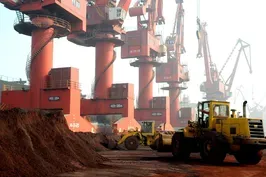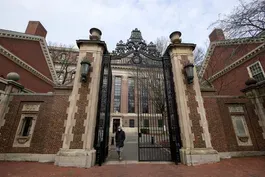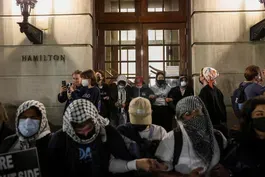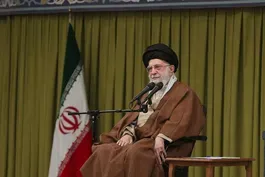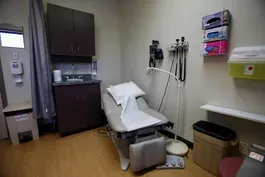
Judge presses DOJ on wrongfully deported man
Clip: 4/15/2025 | 8m 54sVideo has Closed Captions
Judge presses Trump administration on why it hasn't returned wrongfully deported man
A federal judge told Justice Department lawyers to cancel vacation as she launched rapid discovery in the case of a wrongfully deported man. Judge Paula Xinis scolded the Trump administration for doing “nothing” to facilitate Kilmar Abrego Garcia's release from El Salvador’s custody and return him to the United States. White House correspondent Laura Barrón-López discussed more with Mary McCord.
Problems with Closed Captions? Closed Captioning Feedback
Problems with Closed Captions? Closed Captioning Feedback
Major corporate funding for the PBS News Hour is provided by BDO, BNSF, Consumer Cellular, American Cruise Lines, and Raymond James. Funding for the PBS NewsHour Weekend is provided by...

Judge presses DOJ on wrongfully deported man
Clip: 4/15/2025 | 8m 54sVideo has Closed Captions
A federal judge told Justice Department lawyers to cancel vacation as she launched rapid discovery in the case of a wrongfully deported man. Judge Paula Xinis scolded the Trump administration for doing “nothing” to facilitate Kilmar Abrego Garcia's release from El Salvador’s custody and return him to the United States. White House correspondent Laura Barrón-López discussed more with Mary McCord.
Problems with Closed Captions? Closed Captioning Feedback
How to Watch PBS News Hour
PBS News Hour is available to stream on pbs.org and the free PBS App, available on iPhone, Apple TV, Android TV, Android smartphones, Amazon Fire TV, Amazon Fire Tablet, Roku, Samsung Smart TV, and Vizio.
Providing Support for PBS.org
Learn Moreabout PBS online sponsorshipWILLIAM BRANGHAM: Welcome to the "News Hour."
Inside a Maryland courtroom today, another escalation in the legal battle over the man wrongfully deported to El Salvador.
Judge Paula Xinis says she's not yet holding Trump administration officials in contempt, but she said she would not tolerate gamesmanship or grandstanding.
She is ordering the administration to produce details about what, if anything, is being done to bring Kilmar Abrego Garcia back to the United States.
Our White House correspondent, Laura Barron-Lopez, has the latest.
LAURA BARRON-LOPEZ: William, Judge Xinis scolded the Trump administration for doing -- quote -- "nothing" to facilitate Kilmar Abrego Garcia's release from El Salvador's custody and return to the United States.
The judge also said that comments made by El Salvadoran President Nayib Bukele in the Oval Office were not evidence.
President Bukele said that he would not return Garcia to the United States.
For more, I'm joined now by Mary McCord, executive director of the Institute for Constitutional Advocacy and Protection at Georgetown University and former acting assistant attorney general for national security.
Mary, thanks so much for joining us this evening.
You wrote in The Washington Post that Judge Xinis should order senior officials to testify what they're doing to facilitate Garcia's return.
It appears as though the judge maybe did just that today.
She launched this intense two-week inquiry phase and said that she would allow for deposition of up to six administration officials.
What's your reaction to that?
And what do you make of the administration's repeated claims that this is in President Bukele's court?
MARY MCCORD, Former Justice Department Official: So, obviously, we have two separate things there.
And I think Judge Xinis did exactly what she had to do at this point, because last Friday she ordered daily progress reports -- not progress reports, a daily declaration by a person with individual knowledge, a government official with individual personal knowledge, answering the three questions she had.
Where is Mr. Abrego Garcia?
That question did finally get answered on Saturday.
What is the government doing to facilitate his return?
And what additional steps will the government take to facilitate his return?
Those two questions, what they're doing, what they have already done to facilitate, and what they're continuing to do, are still not answered, because each declaration was really obfuscation.
So what she's saying now is, I'm going to allow there to be discovery with depositions, meaning live testimony under oath by government officials, to get to the bottom of what they actually are doing to facilitate his release.
The government, at the same time, is arguing a couple things.
They're arguing that facilitate should be interpreted so narrowly that it simply means that, if the president of El Salvador decides to release Mr. Bukele -- excuse me -- Freudian slip there -- release Mr. Abrego Garcia, that the government will receive him here, the government will accept him.
Of course, they have also said they would put him into immediate custody and initiate new deportation proceedings.
The other thing they're saying is that it's out of our hands to even request that the president of El Salvador, Mr. Bukele, do anything, because this matter is now in his hands that Mr. Abrego Garcia is being held under the domestic authority of El Salvador.
But, mind you, he was not extradited there pursuant to some criminal charges or anything like that.
So these things, these are constantly shifting explanations, and the court is getting to the bottom of it.
LAURA BARRON-LOPEZ: On the lack of those criminal charges,in the last 24 hours, senior administration officials like Secretary of State Marco Rubio have repeatedly accused Garcia of being a member of the MS-13 gang and a terrorist.
White House Press Secretary Karoline Leavitt accused him of human trafficking.
And, so far, the administration has appeared to provide no evidence to back up those allegations.
They also said what you noted, which is that, if he's returned, they will try to deport him to another country.
What is the typical pathway, legal pathway, for deporting someone who had protected status like Mr. Garcia did?
MARY MCCORD: So, in deportation proceedings - - and this all goes to the same type of notice and opportunity to be heard, due process under our law, that the Supreme Court said that those who were deported to El Salvador under the Alien Enemies Act, it's the same thing he's saying, that they get a chance to challenge that.
Here, deportation proceedings would be different than what the Venezuelans might do in terms of bringing a habeas corpus petition in the federal court.
Deportation proceedings, there would be a chance for the person whose ability to stay here is being questioned for them to put on evidence about anything they can do to support that they are lawfully present.
And in terms of what he had achieved in 2019, he was able to testify before an immigration judge that he had left El Salvador because he was persecuted by gangs.
He was a teenager.
His mother sold pupusas.
Gangs were trying to extort her and threatening her children and wanted her to put them into the gangs.
He was sent here by his family.
He's never broken any laws here.
There are no criminal convictions here.
And he fears that he would be persecuted if he were deported to El Salvador.
That is where a judge held in 2019 that he may not be deported to El Salvador.
So, in order to reverse that order, the government would have to go back into immigration court and prove up something that would suggest why that needs to be reversed.
They're saying he's a member of MS-13, newly designated a foreign terrorist organization in late February by the Trump administration, but they have not proved that he is a member of MS-13.
LAURA BARRON-LOPEZ: In another front of Trump's anti-immigration agenda, a Columbia student, Mohsen Mahdawi, who is a legal permanent resident, was detained yesterday while appearing for a citizenship interview in Vermont.
The administration is trying to remove him under the same immigration provision that they're using against students who engaged in pro-Palestinian protests.
Mahdawi has not been charged with a crime.
Is this an escalation on immigrants who have legal status?
MARY MCCORD: There's no question.
I mean, just like with Mahmoud Khalil, also a student at Columbia University, also a lawful permanent resident or green card holder, that's the same as the student who was taken into custody just today, or maybe it was yesterday.
This is what we're starting to see on different campuses.
Students, in some cases even faculties, here lawfully, sometimes on student visas, but these two men were -- had a much higher level than that.
They are lawful permanent residents.
They have the right to be here.
They have a right to work here.
It doesn't mean you have your citizenship.
You are on a path towards citizenship when you have your green card.
And after being here a certain number of years without any criminal charges, you can oftentimes obtain your naturalization to citizenship.
And that's my understanding, what this young man thought he was going to see immigration to talk about, his naturalization.
And, instead, he's being told essentially that his privileges are being revoked because the secretary of state has decided that he is a national security threat.
He has filed -- just like Mr. Khalil, he has filed suit in federal court, alleging First Amendment retaliation and due process violations.
LAURA BARRON-LOPEZ: Mary, with the limited time we have left, on another deportation effort front, President Trump is planning to convert a stretch of the U.S.-Mexico southern border to an Army base, with the intention of using it to deport migrants.
Could this potentially be a violation of the Posse Comitatus Act?
MARY MCCORD: Well, let's just be clear.
The U.S. military may not engage in domestic law enforcement, including directly arresting and detaining and deporting people, under federal immigration laws without violating Posse Comitatus Act.
There would have to be an Insurrection Act invocation based on the things that are in the predicate for Insurrection Act that would allow the U.S. military to engage in domestic law enforcement, things like arrest, seizure, search, detention.
However, on a military base, military officers, military police could detain trespassers and pass them off to law enforcement, and I think that's what is at risk of happening along this border.
LAURA BARRON-LOPEZ: Mary McCord of Georgetown, thank you for your time.
MARY MCCORD: My pleasure.
China cuts exports of rare earth minerals amid trade war
Video has Closed Captions
China cuts exports of vital rare earth minerals as trade war with U.S. intensifies (7m 37s)
Grants frozen as Harvard pushes back against Trump's demands
Video has Closed Captions
Billions in grants frozen after Harvard pushes back against Trump's demands (6m 41s)
How college communities are reacting to funding threats
Video has Closed Captions
How college communities are reacting to funding threats, international student arrests (5m 34s)
Inside the camp where Sudanese refugees have fled civil war
Video has Closed Captions
Inside the crowded camp where Sudanese refugees have fled violence and hunger (9m 57s)
News Wrap: Iran leader downplays chance of nuclear deal
Video has Closed Captions
News Wrap: Iran's supreme leader downplays chance of deal from nuclear talks with U.S. (4m 58s)
Why abortions are rising in U.S. despite more restrictions
Video has Closed Captions
Why abortions are rising in the U.S. despite more restrictions (7m 11s)
Providing Support for PBS.org
Learn Moreabout PBS online sponsorshipSupport for PBS provided by:
Major corporate funding for the PBS News Hour is provided by BDO, BNSF, Consumer Cellular, American Cruise Lines, and Raymond James. Funding for the PBS NewsHour Weekend is provided by...
